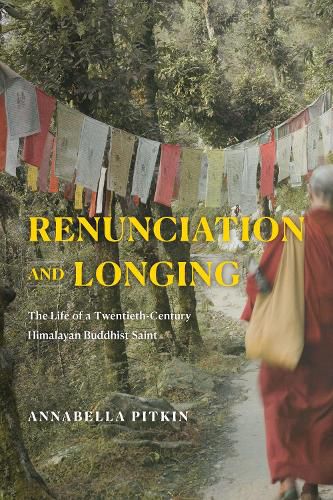Readings Newsletter
Become a Readings Member to make your shopping experience even easier.
Sign in or sign up for free!
You’re not far away from qualifying for FREE standard shipping within Australia
You’ve qualified for FREE standard shipping within Australia
The cart is loading…






This study uses the eventful life of a Himalayan Buddhist teacher, Khunu Lama, to shed new light on contemporary questions of the affective imaginaries of religion, and what it means to be modern.
In the early twentieth century, Khunu Lama journeyed across Tibet and India, meeting Buddhist masters while sometimes living, so his students say, on cold porridge and water. Yet this wandering renunciant became a revered teacher of the Fourteenth Dalai Lama. At Khunu Lama’s death in 1977, he was mourned by Himalayan nuns, Tibetan lamas, and American meditators alike. The myriad surviving stories about him reveal unexpected dimensions of Tibetan Buddhism, shedding new light on questions of religious affect, memory, and what it means to be modern.
In Renunciation and Longing, Annabella Pitkin explores the topics of renunciation, devotion, and the teacher-student lineage relationship as resources for Tibetan Buddhist approaches to modernity. By examining narrative accounts of the life of a remarkable twentieth-century Himalayan Buddhist and focusing on his remembered identity as a renunciant bodhisattva, Pitkin illuminates Tibetan and Himalayan practices of memory, affective connection, and mourning. Refuting long-standing caricatures of Tibetan Buddhist communities as unable to be modern because of their religious commitments, Pitkin shows instead how twentieth- and twenty-first-century Tibetan and Himalayan Buddhists have used the cultural resources that connect them to the past as vital resources for creating new futures.
$9.00 standard shipping within Australia
FREE standard shipping within Australia for orders over $100.00
Express & International shipping calculated at checkout
This study uses the eventful life of a Himalayan Buddhist teacher, Khunu Lama, to shed new light on contemporary questions of the affective imaginaries of religion, and what it means to be modern.
In the early twentieth century, Khunu Lama journeyed across Tibet and India, meeting Buddhist masters while sometimes living, so his students say, on cold porridge and water. Yet this wandering renunciant became a revered teacher of the Fourteenth Dalai Lama. At Khunu Lama’s death in 1977, he was mourned by Himalayan nuns, Tibetan lamas, and American meditators alike. The myriad surviving stories about him reveal unexpected dimensions of Tibetan Buddhism, shedding new light on questions of religious affect, memory, and what it means to be modern.
In Renunciation and Longing, Annabella Pitkin explores the topics of renunciation, devotion, and the teacher-student lineage relationship as resources for Tibetan Buddhist approaches to modernity. By examining narrative accounts of the life of a remarkable twentieth-century Himalayan Buddhist and focusing on his remembered identity as a renunciant bodhisattva, Pitkin illuminates Tibetan and Himalayan practices of memory, affective connection, and mourning. Refuting long-standing caricatures of Tibetan Buddhist communities as unable to be modern because of their religious commitments, Pitkin shows instead how twentieth- and twenty-first-century Tibetan and Himalayan Buddhists have used the cultural resources that connect them to the past as vital resources for creating new futures.